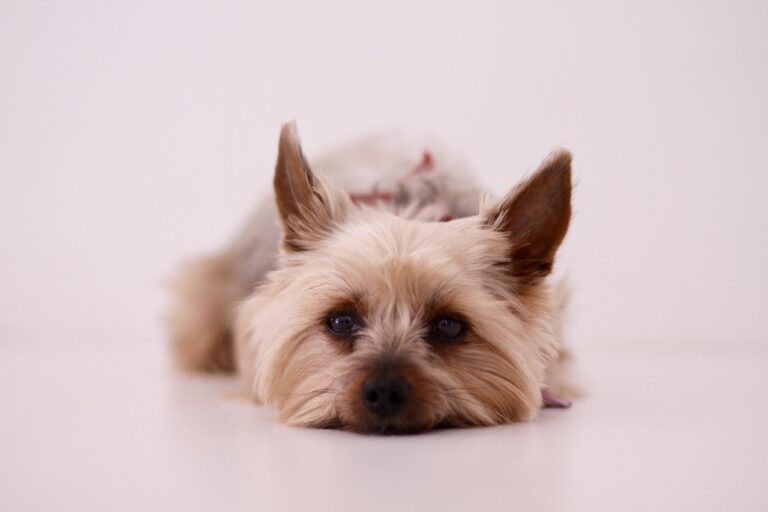Why are Yorkies so clingy?

If you own a Yorkshire Terrier, affectionately known as a Yorkie, you may have noticed their clingy behavior.
These small and adorable dogs are known for their strong attachment to their owners and their desire to be close at all times. In this article, we will explore why Yorkies are so clingy and discuss the reasons behind their affectionate nature.
We will also address common questions related to Yorkie behavior, such as why they want so much attention, get attached to one person, lick excessively, follow you everywhere, and more.
So, let’s delve into the fascinating world of Yorkie companionship and understand why these little dogs are so beloved for their endearing clingy ways!
Why is my Yorkie clingy?
Yorkies are known for their clingy behavior due to their inherent nature as companion dogs. Yorkies were bred to be close companions to their human owners, and their clingy behavior stems from their strong attachment to their human family.
They have a natural desire to be close to their owners and crave their attention and affection. This clingy behavior can also be attributed to their small size, as they are often more dependent on their owners for comfort and security compared to larger dog breeds.
Additionally, Yorkies are known for their social nature and thrive on human interaction, which can lead to their clingy behavior as they seek constant companionship.
So, if your Yorkie follows you around, always wants to be by your side, and seeks your attention, it’s because they deeply bond with their human family and consider themselves as part of your pack.
Why do Yorkies want so much attention?

Yorkies crave attention because they are social and affectionate dogs that thrive on human interaction. They have a strong desire to be in close proximity to their owners and seek constant attention and affection.
Yorkies were bred as companion dogs, and their instinctual nature drives them to seek human companionship. They often form a deep emotional bond with their owners and look to them for comfort, security, and reassurance.
Furthermore, Yorkies are known for their small size, which makes them more vulnerable and reliant on their owners for care and protection. As a result, they may display attention-seeking behavior as a way to feel secure and connected with their human family.
So, if your Yorkie demands attention by sitting on your lap, nudging you, or pawing at you, it’s because they adore being the center of your world and thrive on the love and attention they receive from you.
Do Yorkies get attached to one person?
Yes, Yorkies can develop a strong attachment to one person in their family, although they may also form bonds with multiple family members.
Yorkies are known for their loyalty and devotion, and they often become closely bonded with the person who provides them with the most care, attention, and affection. This person becomes their primary caregiver and source of comfort, and Yorkies may exhibit clingy behavior towards them, following them around and seeking their attention.
However, it’s important to note that Yorkies are capable of forming bonds with multiple family members, and their attachment can vary depending on the individual dog’s personality and experiences.
It’s crucial for all family members to interact and bond with the Yorkie to ensure a healthy and balanced relationship with the dog. Proper socialization, training, and attention from all family members can help Yorkies feel secure and attached to their entire family unit.
Why do Yorkies lick me so much?
Yorkies, like many other dog breeds, may lick their owners or other family members as a way to express affection, seek attention, or communicate.
Licking is a natural behavior for dogs and can have various meanings. For Yorkies, licking may be a way to bond with their owners and show their love and devotion. It can also be a way for them to explore and interact with their environment, including tasting and smelling different scents on their owner’s skin.
Additionally, Yorkies may lick to seek attention or reinforce positive interactions, as they may have learned that licking results in attention or treats from their owners.
However, it’s important to establish healthy boundaries with your Yorkie and discourage excessive licking, as it can become an unwanted behavior.
Regular grooming, dental care, and providing appropriate outlets for your Yorkie’s licking behavior, such as offering safe chew toys, can help redirect their excessive licking tendencies.
How do Yorkies pick their favorite person?

Yorkies may develop a preference for one person in their family based on a variety of factors. Each Yorkie has a unique personality and may be drawn to specific individuals based on their experiences, interactions, and personal preferences.
Some common factors that can influence a Yorkie’s choice of their favorite person include the amount of time and attention that person spends with them, the type and quality of care they receive from that person, and the emotional bond they form through positive experiences, such as playtime, feeding, training, and cuddling.
Additionally, a person’s demeanor, tone of voice, and overall energy can also impact a Yorkie’s preference.
Yorkies are sensitive and intuitive dogs, and they may naturally gravitate towards someone who provides them with a sense of security, comfort, and positive reinforcement.
It’s important to note that while Yorkies may have a favorite person, they can still form bonds and relationships with other family members and should be encouraged to interact with and receive care from everyone in the family to ensure a well-rounded and balanced relationship.
What does it mean when your Yorkie follows you everywhere?

When your Yorkie follows you everywhere, it could be due to their innate instinct to be close to their owner, also known as “pack mentality.” Yorkies are known to be loyal and attached to their human companions, and following their owner around is often a way for them to feel secure and connected.
They may see their owner as their leader or protector and want to be in close proximity to them at all times. Yorkies are social dogs that thrive on human interaction, and following their owner around can be their way of seeking attention, companionship, and reassurance.
It’s also possible that your Yorkie simply enjoys your company and wants to be involved in your daily activities.
However, it’s important to ensure that your Yorkie doesn’t develop separation anxiety or become overly dependent on you, as it’s essential for them to learn to be comfortable spending some time alone as well.
Encouraging independent behaviors and providing them with mental and physical stimulation can help maintain a healthy and balanced relationship with your clingy Yorkie.
Why do Yorkies like to sit with you?
Yorkies are known for their affectionate nature and desire to be close to their owners. They often enjoy sitting with their owners as it provides them with a sense of security, comfort, and companionship.
Yorkies are lap dogs, and sitting with their owner allows them to be physically close, receive attention, and feel the warmth and comfort of their owner’s presence. It also allows them to observe and participate in their owner’s activities, which can be enjoyable for them.
Also, sitting with their owner may also be a way for Yorkies to show their love and loyalty, as they naturally seek closeness and bonding with their human companions.
It’s important to ensure that you provide your Yorkie with enough exercise, mental stimulation, and social interaction to keep them physically and mentally healthy, as excessive sitting or inactivity can lead to obesity or other health issues.
What do Yorkies love the most?
When it comes to what Yorkies love the most, it’s often treats that steal their hearts. These little dogs are known to have a big appetite for food and can be quite food-driven.
Treats are often seen as a form of positive reinforcement and a way to bond with their owners through positive experiences.
Offering treats as rewards for good behavior or during training sessions can help strengthen the bond between a Yorkie and their owner, and can also serve as a way to express love and affection.
However, it’s important to monitor the type and amount of treats given to avoid overfeeding and obesity, as Yorkies are prone to weight gain.
Always ensure that treats are appropriate for your Yorkie’s size, age, and dietary needs, and consult with your veterinarian for specific dietary guidelines and recommendations for your Yorkie’s individual needs.
Do Yorkies think their owner is their mom?
Yorkies may form a strong bond with their owner, but they do not see their owner as their biological mother. Yorkies, like all dogs, do not have the cognitive ability to understand human relationships in the same way humans do.
While they may view their owner as a source of care, protection, and companionship, they do not perceive their owner as their mother in the same way they would perceive their canine mother.
However, it is important to note that Yorkies, like many other dog breeds, are social animals that can form deep emotional connections with their human owners. They may show affection, seek comfort, and display attachment behaviors towards their owner, which can be similar to the bond between a puppy and its mother.
This bond is built through positive interactions, consistent care, and companionship over time, which creates a sense of security and trust for the Yorkie.
Do Yorkies do better alone or in pairs?
Yorkies, like most dog breeds, can thrive both when kept alone or in pairs, depending on their individual personality, temperament, and the environment they are in. Some Yorkies may do well as the only pet in the household, while others may benefit from having a companion of their own species.
If properly socialized and provided with adequate mental and physical stimulation, a Yorkie can be content and happy as the sole pet in the household. They can form a strong bond with their human owner and enjoy undivided attention and affection.
However, Yorkies are also known to be sociable dogs that enjoy interaction with other dogs, so having a companion of their own breed or compatible size and temperament can provide them with additional socialization, playtime, and companionship.
When considering whether to have a Yorkie alone or in pairs, it is important to carefully assess the individual needs, personality, and living situation of your Yorkie. Factors such as age, temperament, activity level, and past experiences can influence their preferences and adaptability to living alone or with a companion.
It is also crucial to provide ample resources, space, and attention to each dog in a multi-dog household to ensure they are all happy, healthy, and well-adjusted. Consulting with a veterinarian or a professional dog behaviorist can also provide valuable guidance in making the best decision for your Yorkie’s well-being.
Why do Yorkies get jealous?
Like many other dog breeds, Yorkies can exhibit signs of jealousy towards their owners or other pets. This behavior may stem from their innate need for attention and affection from their human companions.
When they feel their attention is being divided, they may show signs of possessiveness, such as barking, growling, or displaying dominant behaviors.
To manage jealousy in Yorkies, it’s important to provide them with ample attention, affection, and reassurance.
Avoid showing favoritism among pets or family members, and provide equal attention and care to all. Training and positive reinforcement can also help in managing jealous behaviors in Yorkies.
It’s essential to set clear boundaries and provide consistent, fair, and loving guidance to establish a healthy and balanced relationship with your furry friend.
Remember that jealousy is a normal emotion for dogs, and it can be managed with patience, consistency, and positive reinforcement training techniques.
Seeking guidance from a professional dog trainer or behaviorist can also be beneficial if jealousy behaviors persist or become challenging to manage on your own.
Why do Yorkies like their bellies rubbed?
Yorkies, like many other dog breeds, enjoy having their bellies rubbed due to several reasons. First, it is a sensitive area for dogs with a lot of nerve endings, and gentle belly rubs can be pleasurable and relaxing for them.
Second, belly rubs can be a form of social bonding and affection between a dog and their owner, as it mimics the grooming behavior that dogs would receive from their mother or littermates.
In addition to physical pleasure and social bonding, belly rubs can also serve as a form of trust-building and positive reinforcement for Yorkies.
When their bellies are exposed, they are in a vulnerable position, and allowing their owner to touch and rub their bellies can reinforce the bond of trust and security between the dog and their owner.
It’s important to note that not all dogs may enjoy having their bellies rubbed, and individual preferences may vary. It’s essential to pay attention to your Yorkie’s body language and cues to ensure they are comfortable and enjoying the belly rubs.
Always approach your dog with gentle and respectful touch, and stop if your Yorkie shows signs of discomfort or distress.
In conclusion, Yorkies may enjoy having their bellies rubbed due to the physical pleasure, social bonding, trust-building, and positive reinforcement aspects associated with this form of affectionate touch from their owner.
However, it’s essential to be mindful of your Yorkie’s comfort level and preferences, and always approach with respect and gentleness.
Do Yorkies crave attention?
While Yorkies are naturally affectionate and may exhibit clingy behavior, there are several ways to help them become less clingy and more independent:
- Gradual Separation: Start by gradually increasing the time your Yorkie spends alone, starting with short periods and gradually extending them. This can help them become more comfortable with being alone and reduce their clinginess over time.
- Positive Reinforcement: Reward your Yorkie for independent behavior, such as staying calm when you leave or not excessively following you around the house. Use treats, toys, and praise to reinforce positive behaviors and create positive associations with being alone.
- Training: Provide your Yorkie with basic obedience training, including commands such as “stay” and “wait,” which can help them learn to be more independent and patient.
- Environmental Enrichment: Provide your Yorkie with plenty of toys, puzzle feeders, and other forms of enrichment to keep them mentally and physically stimulated while you’re away, reducing their dependency on constant human attention.
- Gradual Desensitization: If your Yorkie exhibits severe separation anxiety, consider gradual desensitization techniques, such as leaving for short periods and gradually increasing the duration, to help them become more comfortable with being alone.
- Consistency and Routine: Establish a consistent routine for your Yorkie’s daily activities, including feeding, exercise, and alone time, to help them feel more secure and less anxious.
- Seek Professional Help: If your Yorkie’s clingy behavior persists despite your efforts, consider consulting with a professional dog trainer or a veterinarian with experience in behavior modification for further guidance and support.
Remember that each dog is unique, and what works for one Yorkie may not work for another. Be patient, consistent, and understanding as you work with your Yorkie to help them become more independent and less clingy.
Reducing clingy behavior in Yorkies requires a combination of gradual separation, positive reinforcement, training, environmental enrichment, desensitization, consistency, and seeking professional help if needed.
With time, patience, and consistent effort, you can help your Yorkie become more independent and less clingy while maintaining a loving and bonded relationship.
Final thoughts
In conclusion, while Yorkies are known for their affectionate and devoted nature, their clingy behavior can be managed with patience, consistency, and positive reinforcement.
By gradually increasing their independence, providing mental and physical stimulation, and establishing a routine, you can help your Yorkie become more confident and less reliant on constant human attention.
Remember, it’s important to respect their unique personality and needs while working towards reducing clinginess.
With love, understanding, and the right strategies, you can enjoy a balanced and fulfilling relationship with your beloved Yorkie companion. So, embrace the bond, but also help your Yorkie become an independent and confident pup!




